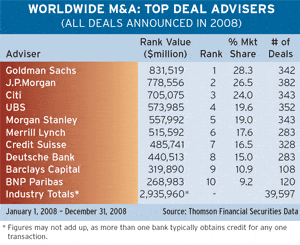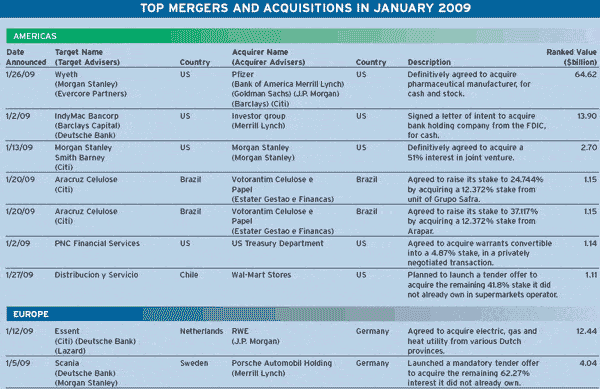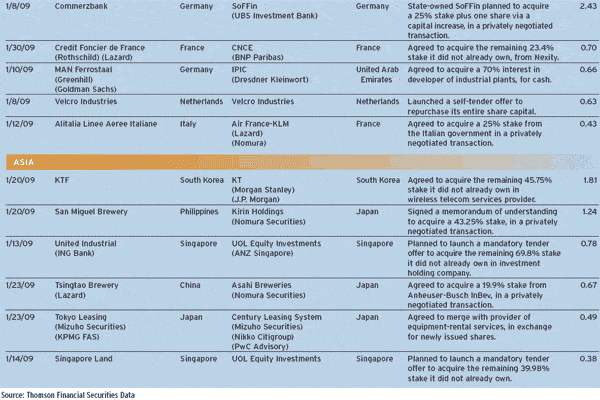Mergers & Acquisitions
 The credit crunch has not put an end to major acquisitions by well-run companies that have a compelling strategic plan and a pile of cash. New York-based Pfizer, the world’s biggest drug maker, agreed in late January to pay $65 billion for rival Wyeth. Pfizer is aiming to strengthen its new-product pipeline to protect itself from a decline in revenue when its cholesterol drug Lipitor loses its US patent in 2011.
The credit crunch has not put an end to major acquisitions by well-run companies that have a compelling strategic plan and a pile of cash. New York-based Pfizer, the world’s biggest drug maker, agreed in late January to pay $65 billion for rival Wyeth. Pfizer is aiming to strengthen its new-product pipeline to protect itself from a decline in revenue when its cholesterol drug Lipitor loses its US patent in 2011.
The transaction will be financed through a combination of cash, debt and stock. Pfizer will borrow $22.5 billion from a consortium of banks, four of which recently received federal bailout money: Goldman Sachs, J.P. Morgan, Citi and Bank of America.
“It’s good to see banks doing what banks are supposed to be doing,” says Jeffrey Kindler, Pfizer’s chief executive. The Greenlining Institute, a Berkeley, California-based advocacy group that seeks to improve the quality of life for low-income and minority communities, sees the lending differently. The institute says it filed an action with the antitrust division of the Justice Department questioning whether the banks were misusing funds they received under the government’s Troubled Asset Relief Program (TARP). It also asked treasury secretary Timothy Geithner to block the takeover. The group says the $22.5 billion would have been better spent on loans to small-business owners to help strengthen the economy, instead of on a merger that is expected to result in the loss of at least 19,500 jobs.
In order to make the deal work and maintain its credit rating, Pfizer will cut its dividend in half. It also agreed to pay a hefty $4.5 billion break-up fee under certain conditions if it does not complete the deal.
The merger is the largest in the pharmaceutical industry since Pfizer bought Warner-Lambert for $93.4 billion in 2000. It is the largest merger overall since AT&T; combined in a $70 billion transaction in March 2006, according to Capital IQ, a division of Standard & Poor’s.
Wave of Mergers Possible
The Pfizer-Wyeth merger could trigger a new wave of consolidation in the pharmaceutical industry, analysts say. David Moskowitz, director of research at investment bank Caris & Company, says 2009 could be an exciting year for pharmaceutical mergers. Schering-Plough and Bristol-Myers Squibb are potential takeover targets, he said in a note to investors. “The industry cannot sustain the number of players we have in major pharma anymore,” he asserts.
Basel, Switzerland-based Roche announced on February 9 that it was launching a hostile bid for South San Francisco, California-based Genentech for about $42 billion. Roche went directly to Genentech’s shareholders after the US-based company’s board last year rejected a negotiated takeover by Roche, which already held 56% of Genentech’s outstanding shares. “We are confident that we will have the financing available when the money is needed,” says Franz Humer, chairman of Roche. “The plan is to use partly our own funds and then obviously bonds, and then commercial paper and traditional bank financing.”
Financial Services Deals
The financial services industry itself is another sector that is likely to be active for M&A; deals in 2009. Dealmaking activity in the financials, energy and power, and consumer staples sectors combined for just over half of worldwide merger activity during 2008, according to Thomson Reuters. Financials led with 23% of worldwide announced M&A; deals last year.
In January 2009 the US government announced the sale of IndyMac Bank, a failed Pasadena, California-based mortgage lender, to a group of private investors led by Steven Mnuchin, a former Goldman Sachs executive, for $13.9 billion. Buyout investor Christopher Flowers, hedge-fund operator John Paulson, billionaire George Soros and computer maker Michael Dell are other members of the investing group.
The Federal Deposit Insurance Corporation agreed to limit the new investors’ losses on IndyMac’s outstanding loans to 20% of the total. In return, the buyer must offer mortgage modifications to IndyMac’s customers. The FDIC says its bank insurance fund stands to lose between $8.5 billion and $9.4 billion on IndyMac, which specialized in mortgage loans with little down payment or proof of assets.
Also in January Morgan Stanley definitively agreed to acquire a 51% stake in a joint venture with Citi’s Smith Barney unit that would create the largest brokerage firm in the world, to be called Morgan Stanley Smith Barney. The joint venture is expected to achieve cost savings of approximately $1.1 billon, in part by consolidating key functions including technology, operations, sales support, product development and marketing.
 Energy Sector Stays Warm
Energy Sector Stays Warm
The energy and power sector also shows every indication of remaining a fertile field for M&A; in 2009. Germany-based RWE, Europe’s fifth-largest utility, agreed in January to acquire Netherlands-based Essent, an electric and gas utility, from various Dutch provinces for $12.4 billion. Upon successful completion of the deal, RWE will become one of the leading energy suppliers in the Benelux region. RWE plans to refinance the deal by issuing bonds over the next two years.
Essent will become RWE’s operating company in the Netherlands and Belgium and will continue as an independent entity responsible for execution of the group’s strategy in these markets. “We are joining forces in the renewables sector, focusing on wind and biomass, and in our efforts to develop the carbon capture and storage technology for a climate-friendly and affordable future energy supply,” Grossmann says.
Meanwhile, this year is shaping up to be a defining year for Middle East businesses and M&A; in the region. “While there won’t be a deluge of deals, the deals that get done will be significant in value—with upper mid-market and multibillion-dollar deals common,” says Philip Broke, partner in the law firm White & Case’s M&A;/corporate practice, based in London, who leads the firm’s sovereign wealth fund initiative. “More importantly, the deals are likely to be strategic purchases that enable companies to become global powerhouses in the same way that Orascom has in telecoms,” he says. Orascom is the first multinational corporation based in Egypt.
In Latin America the pulp and paper market in Brazil is consolidating. Votorantim Celulose e Papel, Brazil’s third-largest pulp maker, agreed in January to a bailout of rival Aracruz to become the world’s largest pulp supplier. In October 2008 Aracruz announced $2.13 billion of losses as a result of its exposure to currency derivatives that exceeded the maximum allowed under its official policy. Aracruz has historically been an active user of currency derivatives, and it bet wrongly that the Brazilian real would continue to soar against the dollar. When investors fled emerging markets during the global credit crisis, the real weakened sharply, saddling Brazil’s largest companies with an estimated $5 billion in currency-related losses.
Brazil’s National Bank for Economic and Social Development (BNDES) contributed $1.4 billion to help São Paulo-based Votorantim Celulose take control of Aracruz and will share ownership of the new company for at least three years. The agreement was reached after Aracruz agreed to a repayment schedule with banks representing more than 80% of its currency derivatives losses.
The merged Votorantim Celulose and Aracruz will be the leading producer of pulp, with estimated annual sales of 5.8 million tons, in addition to sale of about 400,000 tons of paper. The company plans to double capacity of eucalyptus pulp, a short-fiber variety used in specialty papers, to about 8 million tons by 2012.
Some of the biggest M&A; deals in Asia in January involved Japanese brewers looking for growth overseas due to a shrinking home market. Asahi, Japan’s leading brewer, agreed to buy a nearly 20% stake in Tsingtao, China’s largest beer company, from Anheuser-Busch InBev. Kirin, Japan’s second-largest brewery, signed a memorandum of understanding to acquire a 43.25% stake in San Miguel Brewery, the largest producer of beer in the Philippines.
InBev, which acquired Anheuser-Busch last year, is selling assets to repay a bridge loan that helped finance its purchase of the US-based brewer.
According to an analysis by PricewaterhouseCoopers, global M&A; activity in 2009 will focus on distressed investments in financial services, automotive, consumer products and retail. “Troubled companies will look to align with larger, stronger players in order to survive, creating the perfect storm for mergers of necessity,” says Robert Filek, a partner in PricewaterhouseCoopers’ transaction services group.


Gordon Platt



